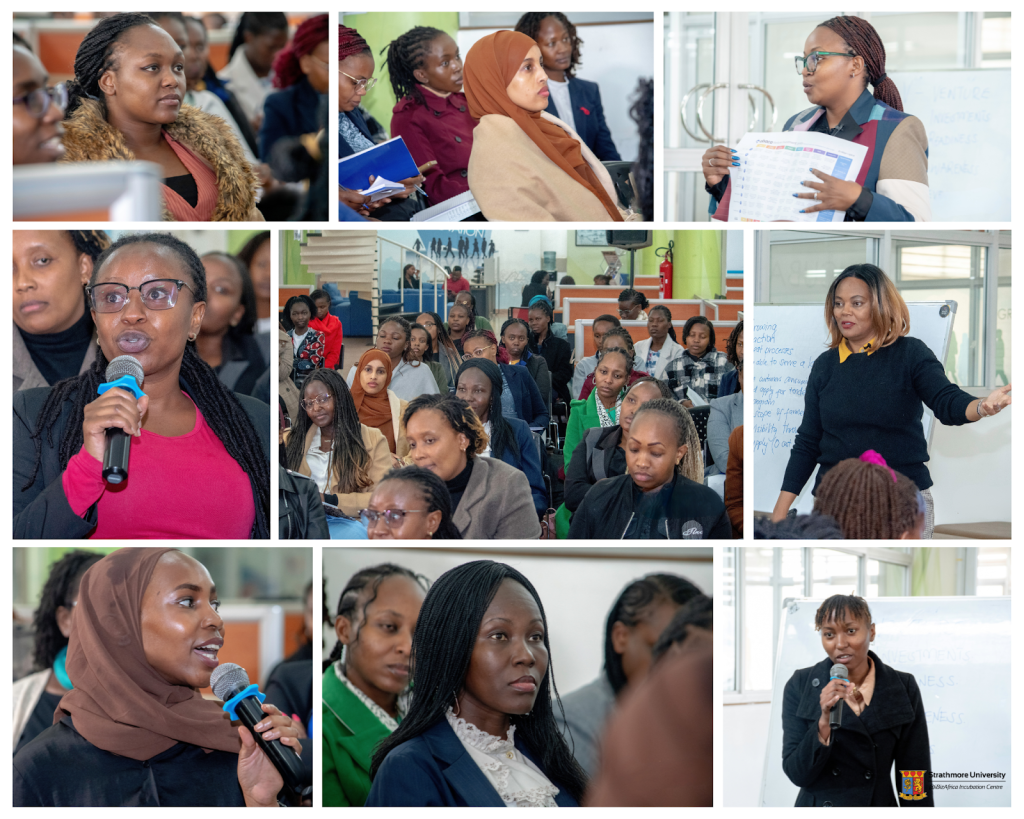
By the time most startups begin thinking about scale, they are already feeling the pressure, whether from clients, users, or investors, to grow fast. But as the founders in Cohort 8 of the Futuremakers Women in Tech Program learned this past week, scaling is not just about growth. It is about readiness.
The Learning Series, a two-day blend of in-person and virtual sessions, brought together 60 promising women-led ventures from across Kenya for a deep dive into the building blocks of scalability and investment preparedness.
The message was clear: if you want to scale sustainably, you need more than a good idea. You need systems, strategy and the right kind of support.
Day 1: Is Your Startup Ready to Grow?
Held at @iBizAfrica – Strathmore University, focused on Assessing Maturity and Scalability for Growth. Irene Mwihaki, Director of Marketing & Partnerships at Elimu Holdings Limited, encouraged founders to rethink how they define progress.
“Before you scale, ask yourself: can your current operations support 10x growth?” Irene asked. “Because scaling a weak system only multiplies your challenges.”
This sparked a conversation around operational readiness, a concept often overlooked in the early stages. It is not just about acquiring users or launching features; it is about building the internal capacity—processes, people and systems that can support sustainable growth.
Mapping the Journey: Tools That Make It Real
To reinforce this mindset shift, Brenda Wangari, Senior Program Manager, and Jesse Karuga, Investment Analyst, both from Village Capital, guided participants through Abaca, a free tool that helps founders understand their investment readiness journey.
At the heart of Abaca is the VIRAL framework, which evaluates startups based on eight dimensions, including team, traction and product maturity.
The key,” Brenda noted, “is not just identifying what you’ve already achieved. It’s understanding what comes next and aligning your strategy and pitch to that.”
Each founder walked away with a personalized Abaca profile, which they will continue building on throughout the program.
Day 2: Understanding the Investor Landscape
The second day transitioned online with Adelaide Muthang’i, Investment Associate, delivering a practical, eye-opening session on Types and Clusters of Investors.
She demystified the many pathways to funding, covering:
- Debt financing (e.g., secured loans, convertible notes)
- Equity investments from angel investors, Venture Capitalists (VCs) and Private equity firms (PE)
- Grants and blended finance from corporates and foundations
- Crowdfunding models
- Friends and Family—often the earliest form of capital
Each option came with trade-offs. Convertible debt can be flexible early on, but risky if not well structured. Grants are non-dilutive, but highly competitive. Angel investors might bring mentorship, but not always the structure needed for future fundraising.
“Not all money is good money,” Adelaide reminded the group. “It’s not just about where to get funding—but when and from whom.”
Founders were then guided to refine their elevator pitches and begin identifying investor types that align with their stage, model and values. For those unfamiliar with investment terms, the Global Impact Investing Network (GIIN)’s glossary is a great place to start.
Why This Matters for Africa’s Startup Ecosystem
Throughout both sessions, one thing became clear: these founders are building with intention.
By leveraging frameworks like VIRAL, tools like Abaca and grounded advice from experienced facilitators, the Learning Series empowered participants to sidestep common pitfalls—like scaling prematurely, pursuing misaligned investors, or skipping over foundational business systems.
In a landscape where founders are under pressure to grow quickly, this Series was a powerful reminder: clarity, intentionality, and alignment matter just as much as ambition.
As the program moves toward Selection Day, the 60 ventures will be narrowed down to the Top 15 who’ll proceed to the next phase. The stakes are rising—but so is the confidence and clarity among participants.
Explore the Tools
If you are a founder working toward scale, here are a few of the resources shared in the Learning Series:
These tools are free and publicly available; a great starting point for understanding your own journey to scale.
Have you faced challenges scaling or fundraising as a startup founder? What do you wish someone had told you earlier?
Let’s keep the conversation going because when founders share, ecosystems grow stronger.
